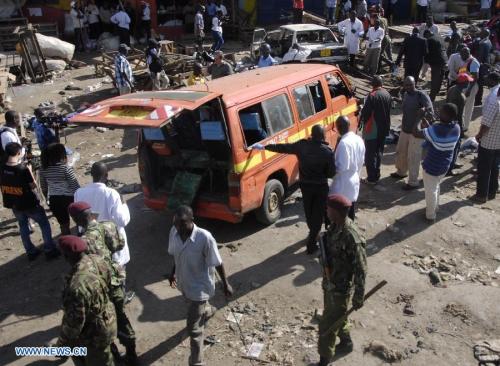肯尼亚首都发生连环爆炸至少10人死亡
The explosion at the Gikomba market, on the outskirts of the capital’s Central Business District, once again puts the spotlight on Kenya’s intelligence and security agencies. Prior to the attacks, a number of western countries like the US, Britain and Australia, had issued travel advisories against the East African country. But President Uhuru Kenyatta says the advisories are unwarranted and accuses the countries issuing the advisories of playing into the hands of terrorists.
Kenya has come under increasing terrorist attacks, with many of those attacks resulting in the loss of innocent lives.

Military guards and the crowd assemble around the exploded bus in Nairobi, capital of Kenya, May 16, 2014. At least ten people have been confirmed dead and 70 others injured in two explosions in Kenya's capital Nairobi on Friday.(Xinhua/Simba)
So far, the Kenyan government has responded by putting in place measures like an aggressive security operation to round up illegal immigrants, that has seen deportation of hundreds, increased patrols and commissioning of extra police officers, plus impounding of vehicles with tinted windows, as part of measures to thwart terrorism. This however appears not to be enough.
Analysts say the attacks are linked to Kenya’s military incursion into Somalia three years ago. the Alshabab militants have said as much, when bearing responsibility for some of the attacks . Calls for Kenya’s troop withdrawal have been rebuffed by government officials, with the Deputy president describing such a move as cowardly.
There’s no doubt the attacks have had adverse effects on the country’s economy especially the tourism sector.
So far, a number of western countries including the U.S, Britain and Australia have issued travel advisories, with Britain chartering flights over the last two days to evacuate its citizens from the coastal city of Mombasa, amid warnings of an attack .
It’s an action that the Kenyan government has not taken kindly.
"Acts like were done yesterday by the people you’ve mentioned only strengthens the will of terrorists as opposed to helping us defeat them," Kenyan President Uhuru Kenyatta said.
But given that countries are known to share intelligence on serious threat like terrorism, it certainly raises questions about Kenya’s own capacity to deal with security challenges.
The president says international partners had not shared any intelligence with Kenya, to justify their decision to issue alerts,
"If indeed they have something more than they have already shared with us that warrants what they have done then they haven’t shared with our officers," Uhuru Kenyatta said.
Even as president Uhuru Kenyatta was speaking reports came in of a series of explosions at one Nairobi’s busiest markets- more evidence that whatever the official word on security actions are speaking far louder
The blast in Gikomba is just the latest sign of Kenya’s ongoing struggle to fight terror. Two weeks ago, 6 people were killed in explosions in Mombasa and Nairobi.
It’s a fight, however, that Kenya’s president says Kenya will not give up on, until victory is attained and the country is once again secure.